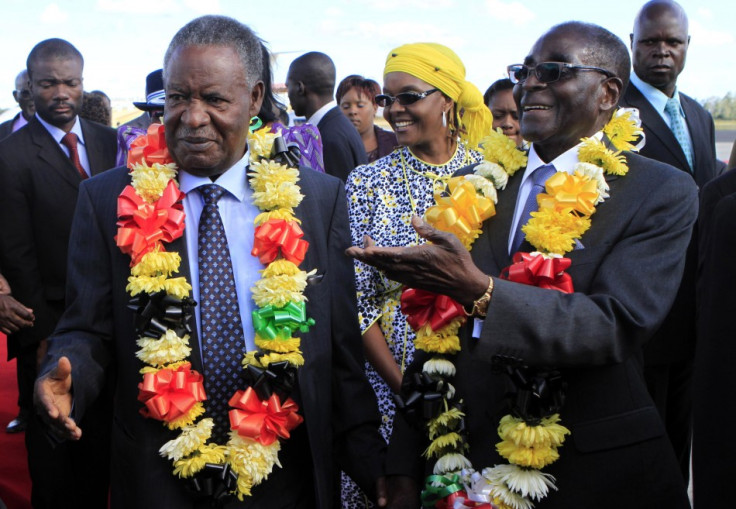Zambia Slides Further Towards Dictatorship [BLOG]
Opinion
A troubling ruling by Zambia's highest court provides yet more evidence of creeping autocracy in Zambia, where, as Chuck Parnell finds out, attacks on judicial independence are part of a larger push for total control of state power.

Zambia's current political climate is shaped by 22 years of multi-party contestation for power and most recently the election of President Michael Sata's Patriotic Front (PF) party into power following largely free and fair elections in September 2011. Positive sentiment towards the new government provided an extended honeymoon for the PF as they embarked upon a program of government intended to fulfil many ambitious campaign promises aimed at creating jobs, reducing corruption and putting more money into the hands of poor Zambians.
While the minimum wage was raised significantly and the economy continues to grow at a healthy rate, the PF is being less successful in its attempts to fight corruption and make Zambia an attractive destination for foreign investment. More worryingly, the PF has not followed through on the many points in its manifesto that elevate human rights, good governance the rule of law and democracy as priorities of its administration.
On the contrary, it has implemented a campaign of intimidation against its political opponents, threatened neutral civil society organisations, interfered with the operations of the judiciary and rowed back on important reforms designed to promote more government transparency and space for civil society.
Judicial interference
It was perhaps unsurprising when, on the 9 May, a majority of Zambia's Supreme Court came to the rescue of President Michael Sata and his attempts to protect two of his closest allies from legal sanction. The case actually concerns the suspension by Sata of three high-ranking judges that had been involved in passing judgment against his two allies - Mutembo Nchito (now the Director of Public Prosecutions) and Fred Mmembe, editor of The Post newspaper.
Subsequent to the suspension, Sata established a tribunal of enquiry into the conduct of these three judges. Both the suspension and tribunal establishment relied on powers granted to the President under the constitution, however both ignored clearly laid down procedures for sanction of judicial officers.
Sata's actions had caused a furore in Zambia and even the International Commission of Jurists sent a high level delegation to the country to plead with the government to return Zambia to constitutionalism by reversing these decisions that clearly represented executive overreach by Sata.
The Zambian High Court subsequently decided that the three judges should be allowed to appeal the decision to suspend them but now, a majority of the Supreme Court led by Acting Chief Justice Lombe Chibesakunda (a cousin of Sata's) has ruled that the President's actions had been constitutional and that the tribunal's establishment was not unlawful.
It is rumoured that the Acting Chief Justice calls Sata on a direct line each time she needs to make an important decision affecting the judiciary. When she attended a judges' conference in Ireland some months ago, she called during the tea breaks to inform him of what was being said during the meeting.
A convenient constitution?
While Sata cements his control over the judiciary, his government is also making sure that necessary legal reforms do not result in a reduction of power for the ruling Patriotic Front (PF). The PF had promised Zambians a new constitution within 90 days of their election.
Now, almost two years later not only is there no new constitution but it appears as if the party has reversed its previously progressive position on some key issues. For example, it no longer supports the introduction of a majoritarian system for the election of president, something that they had consistently advocated for while in opposition.
The PF government has also not set out how the new 'people's' constitution will be enacted and now seem not to favour putting the entire document to a referendum as they had once promised to do. By increasing their numbers of MPs, the PF now seem intent on gaining an absolute majority that would allow them to pass most of the constitution through parliament, including provisions that would entrench systemic weaknesses in Zambia's democracy.
The government has also shelved for over a year a very progressive piece of legislation providing for access to information. This new law would strengthen accountability and transparency in public life and also make it more difficult for public funds to be used for personal or party gain.
Back to the future
Since assuming power in September 2011, the actions of President Sata and his closest allies in the PF government leave many Zambians feeling that he is dragging Zambia back to the 'bad old days' of the one party state. Sources confirm that no one in Cabinet dares to take on Sata during meetings. If someone does raise an objection to him or the party he has been reported to reply "go form your party and criticise it."
As if embodying the idea of 'the party and its state', Sata's key ally and successor in waiting, Wynter Kabimba, is at once the Secretary General of the party, the Minister of Justice, a board member of several parastatal companies and a member of the Constitution Technical Committee. Kabimba is relatively young, ruthless, strongly supported by Sata and very powerful on account of the several influential positions he holds. He has recently been unofficially campaigning across the country in an attempt to build his image as a man of the people. With rumours circulating about Sata's failing health; many conclude that Kabimba is being readied for the Presidency in 2016, if not earlier.
Sata's drive to concentrate power close to him appears to have seriously divided the ruling party with some moderates being sidelined or silenced. Given Lubinda, the Minister of Foreign Affairs, was fired from his cabinet post in February and now languishes on the backbenches after allegedly 'leaking' information to opposition political parties. Other senior members of the party appear unable to influence Sata and are worried by his tendency to exert absolute control over every organ of the state.
The Chair of the Constitution Technical Committee, the Speaker of the Parliament and the Chief Justice are reportedly to some extent unable to act without Sata's express approval. Information that reaches the public is also not as balanced as it once was. The two state-owned daily newspapers remain little more than government mouthpieces while the private Post newspaper is fiercely loyal to the ruling PF.
Change in Zambia, as it always has, will have to come from within. Zambia is fortunately endowed with a relatively vibrant civil society and numerous opposition political parties, who now need to respond in kind to increasing repression and state capture by the government. Perhaps a harbinger of what is to come, students took to the streets of Lusaka on the 15 and 16 May, some of them running pitched battles with police in full riot gear. This comes as part of an angry civil society reaction to the scrapping of maize subsidies, which may well raise staple food prices and impact directly on the food security of the poorest Zambians.
To continue being an effective and impartial voice, Zambia's civic movement could benefit enormously from knowing that the region and the international community are watching Sata. Although SADC's record of intervening on domestic conflicts is chequered to say the least, a strong statement from the regional grouping would be welcomed by civil society organizations who are feeling vulnerable and isolated.
There is still time to rescue the situation prior to the 2016 elections, but if the current trajectory is left unchecked, those elections are likely to be little more than a formality.
Chuck Parnell works on civil society development in southern Africa and writes in his personal capacity.
© Copyright IBTimes 2025. All rights reserved.





















